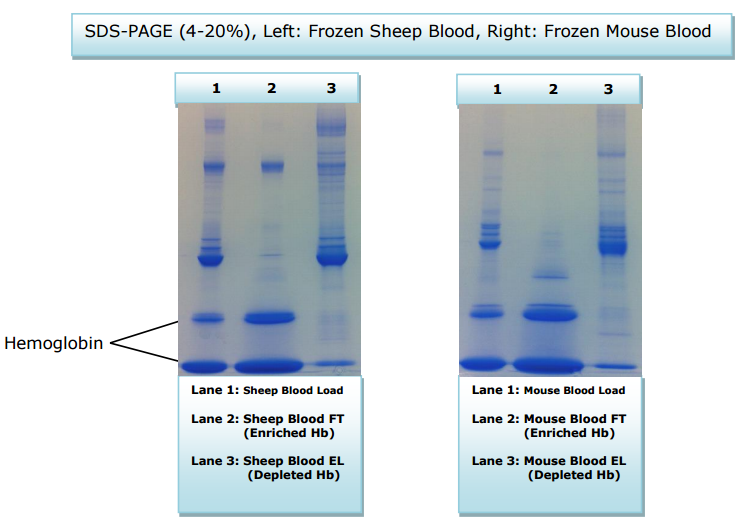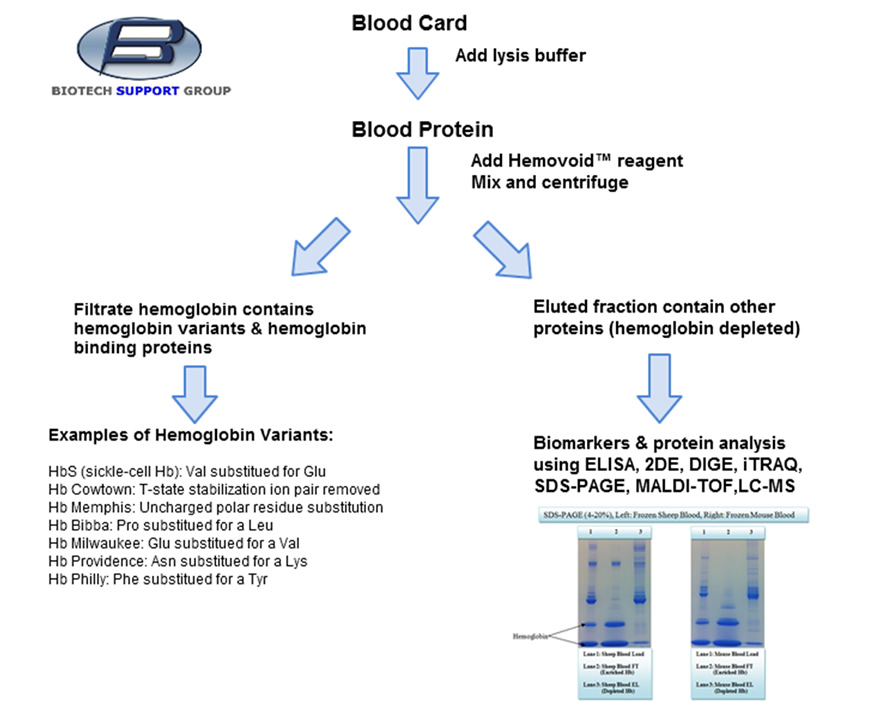|
*NEW* Application of HemoVoid: Hemoglobin Enrichment for Hemoglobin Variant Research
 
Researchers using HemoVoid™ can study purified hemoglobin from a blood sample, or choose to study the other blood proteins, without the interference of hemoglobin. HemoVoid™ will allow researchers and scientists to understand how hemoglobin itself works. Through the science discovered at Biotech Support Group, HemoVoid™ remains one of the only products in the market today that can separate hemoglobin from a blood sample, without destroying the intrinsic bonds within the protein. A NEW HemoVoid™ Application: Hemoglobin Enrichment Protocol From Blood Sample For Hemoglobin Variant Research (HbS, HbF, HbA, HbA1c, Thalassemia, etc.) 
• Enriched Hemoglobin voids in flow-through >98% pure, with <30 minute bind/wash/elute protocol Quantification and subsequent analysis of the Hb fractions and variants is possible by implementing combination of cation-exchange high performance chromatography (CE-HPLC), capillary electrophoresis (CE) and when possible isoelectric focusing (IEF). The HemoVoid™ reagent kit is compatible with HPLC analysis of hemoglobin variants by cation exchange procedure which allows the separation of normal and numerous variant hemoglobins as dimers, or the reversed phase method making it possible to separate polypeptide chains. For more information about HemoVoid™ protocol for hemoglobin enrichment, click here: For more information about HemoVoid™, click here.
CONTACT: HemoVoid™ References:
Suggested References:
For this new application protocol, please contact us by phone or email.
Posted on Date:
Tue, 05/01/2012
|

- About
- Products
- Hemoglobin Removal Kits
- Lipid Removal & Clarification
- Urine Protein & Low Abundance Enrichment
- Class Specific Enrichment
- Sample Prep Mass Spectrometry
- Functional & Chemical Proteomics
- Genomic Sample Prep
- Accessories
- Technical Resources
- References
- Publications & Reports
- FAQs
- Case Studies
- Cleanascite™ Unlocks Insights into Lipid-Driven Tumor Immunosuppression
- NRicher™ Bead Platform Provides Unique Sub-Proteome Biases And Fit For Purpose Opportunities for Targeted LC-MS Quantification
- BSG Products To Assist in Analyzing Macrophage Polarization
- Ectodomain Shedding and Enrichment of the Soluble Membrane Proteome
- Investigate out of the Venn Diagram box
- Methods to selectively deplete or purify Hemoglobin from Dried Blood Spots (DBS)
- The Utility of HemoVoid™ is Demonstrated in 3 Proteomic Investigations Identifying Potential Disease Specific Biomarkers
- The 4 common features of our sample prep products, known as the BSG Advantage, are highlighted in a selection of journal references.
- AlbuVoid™ Workflows Advance Cell Secretome Proteomics
- Lipid Removal for Phenotypic Cell Response in Cancer Research
- The Influence of Sample Prep Bias on LC-MS Targeted Peptide Quantification in Serum Proteomics
- Re-imagining proteomics for developing precision medicine biomarkers of the innate immune response in SARS-CoV-2
- Patent Application Describes New Proteomic Methods to Monitor Protease Inhibitor Function During Covid-19 Infections
- Efficient Hemoglobin Removal Advances Red Cell Proteomics Offering Many New Insights Into Inflammation and Infectious Disease
- The Potential for New Blood Biomarkers in the Management of COVID-19 Disease
- Establishing the Utility of HemoVoid™ and HemogloBind™ as Enrichment Tools for Proteomic Analysis of Red Cells and Whole Blood in Parkinson’s Disease
- Species Diversity Supported By BSG Products
- Poster Report Describes Loss of Functional Serpin Activity In Cancer Patient Blood
- AlbuVoid™️ PLUS & AlbuSorb™️ PLUS Evaluating Different Windows of Observation Solves The Many Challenges of Serum Proteomics
- Tackling the Challenges of Serum Proteomics
- Lipid Removal Sample Prep for Cell Response Applications
- Sample Prep for Proteomic Analysis of Saliva
- Biotech Support Group Featured in Book, "Functional Proteomics – Methods and Protocols"
- Sample Prep Liquid Biopsy Products Suitable for Proteomic Profiling of a Variety of Body Fluid Sample Types
- Albumin and High Abundance Depletion
- Using HemogloBind™ as a Hemoglobin Binding Reagent
- Diverse technologies available for researchers to selectively bind or enrich exosomes and extracellular vesicles.
- Stroma Liquid Biopsy™ Biomarkers Profile Pan-Cancer Dysregulation of the Serum Proteome
- Diverse Depletion and Enrichment Technologies Enhance Simplicity and Efficiency of Obtaining Quality Proteomic Information
- Use On-Bead Digestion to Improve Time Required for Serum Digestion
- Using AlbuVoid™ as a Serum Protein Enrichment Kit in Functional Proteomics
- Using Cleanascite™ as a Lipid Absorption and Clarification Reagent
- Using HemoVoid to Remove Hemoglobin Before Analysis
- Blog
- Contact
- Liquid Biopsy